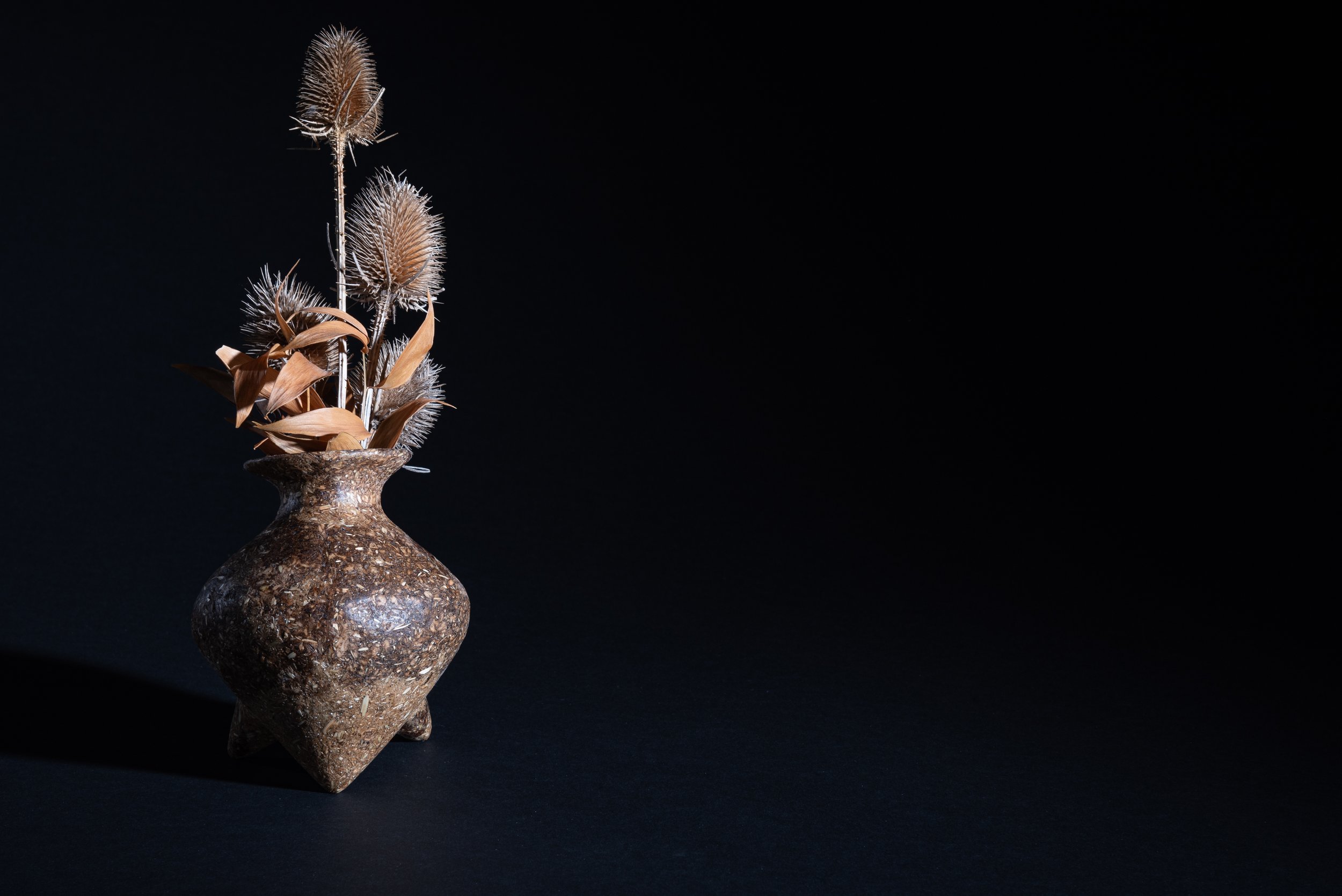Urns of Restoration
A story of Ecological Restorative material
The objective of this project was to design a meaningful object that symbolizes the ecological degradation of our landscape, employing thoughtful considerations of form and materiality, and involving the intentional utilization of materials crafted from the organic matter of local non-native, invasive plant species, which pose challenges to our local environments.
Embracing an ethos of restoration within local communities, promoting ecological restoration through the application of craft practices, and tapping into a deeper context of turning this material into a tangible, recognisable object: the urn, which culturally symbolises ‘death’, encouraging the audience to contemplate that we too, shall return to the earth one day, that we too are a part of the system where in nature, death simply means nutrient exchange.
A performance piece documented to contextualise returning to the earth with the urn full of ecological restorative material; compost, and converse with the audience the importance of circular systems, recycling of materials/nutrients, and our need to build a deeper kinship with the environment.
This project harnesses and utilizes Himalayan Balsam (Impatiens glandulifera), a non-native, invasive plant species causing ecological damage to our River Wye and local native biodiversity, focusing on ecological restorative craft by removing this plant from the environment, drying, processing, and re-purposing the organic material into a crafted item to bring value to the act of removing and to open up a discourse on beyond sustainable material.












The material, bound together with Brown Algae and tree sap, is entirely biodegradable and non-toxic, despite the plant's invasive nature, holding the potential to be transformed into a material as sturdy as wood yet as adaptable as clay.











This book is now available to download as a PDF, It has been distributed through some bookshops which was my last print. Please head to the shop to download it, all I ask for is a small donation.
A story of ecological restorative materials film
This short film serves as a poignant portrayal of the artist's connection with the natural world, expressed through the transformative power of materiality and the art of restoration.
A crafted vessel symbolising the timeless urn, meticulously fashioned from biodegradable materials; brown algae extract, tree sap & Himalayan Balsam, an invasive non-native species thriving due to human intervention- a poignant commentary on the unintended consequences of our landscape decorative desires, where aesthetics and environmental damage intertwine.
Ferrier’s choice to repurpose this “problematic” plant into a vessel of significance underscores the essence of ecological craftsmanship. It challenges our perception of waste, inviting contemplation on the inherent value within discarded materials and promoting a paradigm shift towards environmental restoration through the circularity of materials.
The urn, an emblem of mortality recognised by all, becomes a vessel for Ferrier’s deeply personal narrative- a testament to her intimate bond with the land. It’s a landscape that serves as solace during times of grief, a sanctuary amidst turmoil. Through the urns, Ferrier articulates her journey through the stages of loss, navigating the complexities of relationships severed and environments degraded.
Central to this narrative is the symbolism of compost – an emblem of cyclical regeneration. Here, death transcends & becomes nourishment, echoing the perpetual cycle of life and decay inherent in nature. Ferrer intertwines this theme of circularity, urging us to reconsider our relationship with materials and the environment as extensions of our own well-being.
Ultimately, this material odyssey serves as a poignant reminder of our intrinsic connection to the natural world. It challenges us to embrace circular systems and recognise that our health is inexorably linked to the health of our environment – a profound statement that we are not separate from nature, but rather nature holds us in its intricate tapestry.

Available for exhibitions & workshops
Press package available with password request
Our world is at a tipping point, and we must change our irresponsible manufacturing and consumption habits. That's why Sophie is continuously experimenting with new methods to create products from local organic waste and renewable materials. Striving to eliminate the harmful environmental impacts caused by toxic substances, irresponsible natural resource usage, and the international shipping of raw materials.
Sophie’s materials are handcrafted from 100% natural ingredients, ensuring that after their useful life, they can be composted or broken down to create new products.
Himalayan Balsam Lampshade
Available on commission base.



